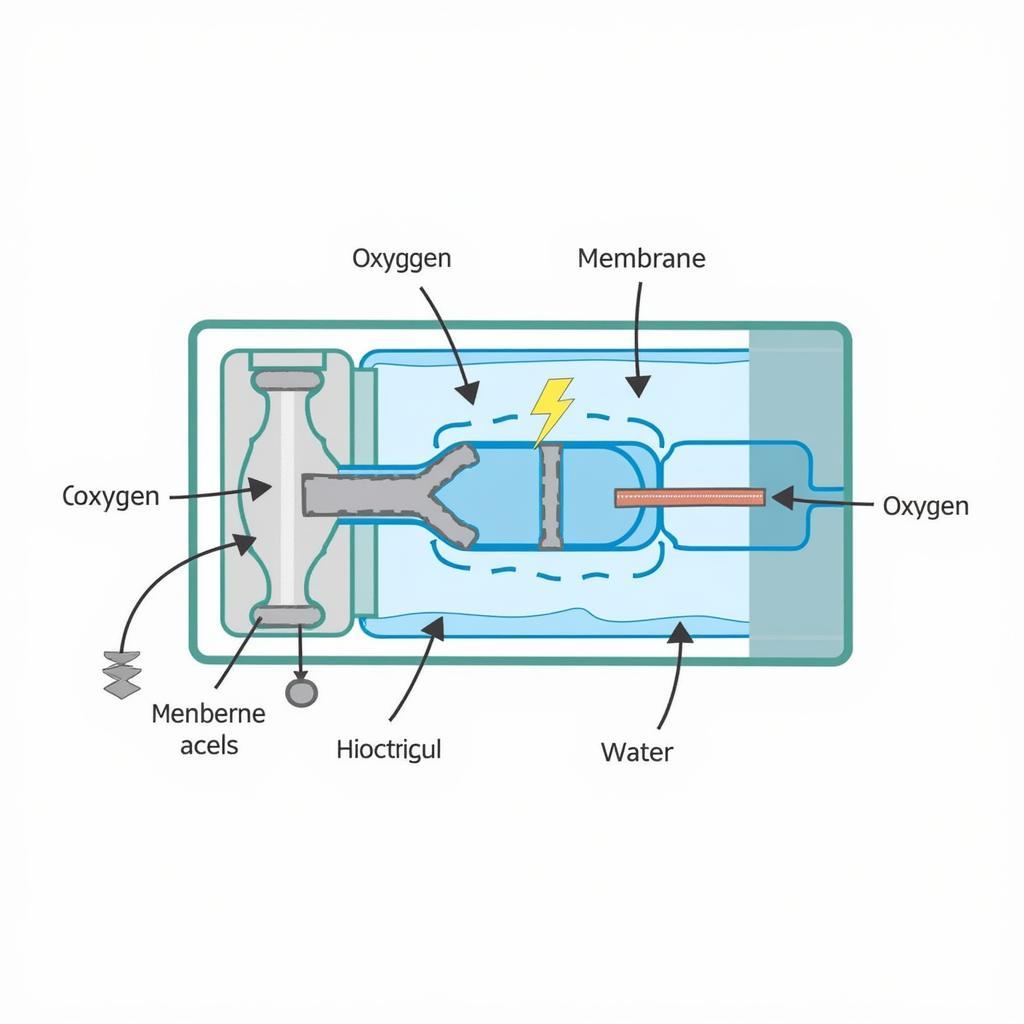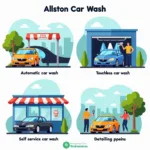Hydrogen gas cars are emerging as a potential game-changer in the automotive industry, promising a cleaner, more sustainable future. They offer a compelling alternative to traditional gasoline-powered vehicles and even battery electric cars, with their unique advantages and challenges. This article will delve into the intricacies of hydrogen gas car technology, exploring its potential benefits, current limitations, and the role it might play in the future of transportation. After reading this, you’ll understand why the phrase “hydrogen gas car” is becoming increasingly common in discussions about sustainable mobility.
Hydrogen cars utilize fuel cells to convert hydrogen gas into electricity, which then powers the vehicle’s motor. This process produces only water vapor as a byproduct, making hydrogen cars incredibly environmentally friendly. Unlike battery electric cars, hydrogen cars refuel quickly, similar to gasoline cars. This eliminates the “range anxiety” associated with electric vehicles and makes them suitable for long-distance travel. However, the infrastructure for hydrogen refueling is still underdeveloped, posing a significant challenge to widespread adoption. This begs the question: are hydrogen cars the ultimate solution to our transportation needs, or just another step in the ongoing evolution of automotive technology? Let’s explore further.
If you are interested in learning more about the history of gasoline-powered vehicles, check out our article on how long has gas powered cars been around.
The Mechanics of Hydrogen Gas Cars: How Do They Work?
The core component of a hydrogen car is the fuel cell. This electrochemical device combines hydrogen gas with oxygen from the air to produce electricity, heat, and water. The electricity generated powers the electric motor, propelling the vehicle. The only tailpipe emission is water vapor, making them a zero-emission vehicle at the point of use. This clean operation is a major advantage of hydrogen cars over traditional combustion engine vehicles. The process is remarkably efficient, converting a high percentage of the chemical energy stored in hydrogen into usable electrical energy.
Understanding Fuel Cells: The Heart of Hydrogen Vehicles
Fuel cells are often described as the reverse of electrolysis, the process of splitting water into hydrogen and oxygen using electricity. In a fuel cell, hydrogen and oxygen are combined, producing electricity. This electrochemical reaction is the key to the clean operation of hydrogen cars. There are various types of fuel cells, but the most common type used in automotive applications is the Proton Exchange Membrane (PEM) fuel cell.
The Advantages of Hydrogen Gas Cars: A Cleaner Future?
Hydrogen vehicles offer several advantages over traditional gasoline cars and even battery electric vehicles. Their zero-emission operation contributes significantly to cleaner air and reduced greenhouse gas emissions. They also boast a fast refueling time, often just a few minutes, comparable to filling a gasoline tank. This makes them more convenient for long journeys. Furthermore, hydrogen has a high energy density, potentially offering a longer driving range than current battery electric vehicles.
Environmental Benefits: Zero Tailpipe Emissions
The biggest selling point of hydrogen gas cars is their environmental friendliness. Producing only water vapor as a byproduct, they offer a truly clean driving experience. This eliminates the harmful pollutants associated with gasoline engines, contributing to improved air quality and reduced respiratory illnesses. This aligns with the growing global focus on sustainability and reducing carbon footprints. Have you wondered about the role of a car catalytic converter in reducing emissions? We have an article about that!
The Challenges of Hydrogen Technology: Roadblocks to Adoption
Despite the promising advantages, several challenges hinder the widespread adoption of hydrogen cars. The lack of a robust hydrogen refueling infrastructure is a major obstacle. Building a network of hydrogen fueling stations requires significant investment and coordination. The production of hydrogen itself can be energy-intensive and may rely on fossil fuels, negating some of the environmental benefits. The cost of fuel cells and hydrogen storage tanks remains relatively high, making hydrogen cars more expensive than comparable gasoline or electric vehicles. Thinking about alternatives? We’ve also got an article about the toyota electric car.
Infrastructure Development: The Chicken and Egg Problem
The limited availability of hydrogen refueling stations presents a “chicken and egg” dilemma. Consumers are hesitant to purchase hydrogen cars without readily accessible refueling options, while companies are reluctant to invest in infrastructure without sufficient consumer demand. This lack of infrastructure is a significant barrier to the mass adoption of hydrogen technology.
The Future of Hydrogen Gas Cars: A Promising Outlook?
Despite the current challenges, the future of hydrogen gas cars holds considerable promise. Ongoing research and development efforts are focused on improving fuel cell efficiency, reducing production costs, and exploring sustainable hydrogen production methods. Governments and private companies are investing in building hydrogen refueling infrastructure. As technology advances and costs decrease, hydrogen cars could become a more viable and attractive option for consumers seeking a clean and sustainable mode of transportation. Check out our informative article on car battery positive and negative to enhance your knowledge. Also, you might be interested in learning if Tesla has ventured into the hydrogen car market. Our article on is there a tesla hydrogen car provides insightful information on this topic.
Conclusion
Hydrogen gas cars represent a compelling alternative to traditional gasoline-powered vehicles, offering a cleaner and more sustainable transportation solution. While challenges remain in terms of infrastructure development, production costs, and storage, the potential benefits of zero-emission driving and fast refueling times are significant. As technology advances and investment in the hydrogen economy grows, hydrogen gas cars could play a crucial role in the future of mobility.
FAQ
- Are hydrogen cars safe? Yes, hydrogen cars are designed with safety features comparable to gasoline and electric vehicles.
- How long does it take to refuel a hydrogen car? Refueling a hydrogen car takes only a few minutes, similar to filling a gasoline tank.
- What is the range of a hydrogen car? The range of a hydrogen car varies depending on the model and tank size, but many can travel over 300 miles on a single tank.
- Where can I refuel a hydrogen car? Hydrogen refueling stations are currently limited, but their numbers are growing.
- Are hydrogen cars expensive? Currently, hydrogen cars are generally more expensive than comparable gasoline or electric vehicles.
- Is hydrogen a renewable resource? Hydrogen itself is not a renewable resource, but it can be produced from renewable sources like water through electrolysis.
- What are the environmental benefits of hydrogen cars? The biggest environmental benefit is the zero tailpipe emissions, resulting in cleaner air and reduced greenhouse gases.
Common Scenarios and Questions
-
Scenario: You’re planning a long road trip and are concerned about charging times for electric vehicles.
-
Question: Would a hydrogen car be a suitable alternative?
-
Scenario: You live in an area with limited charging infrastructure for electric vehicles.
-
Question: Could a hydrogen car be a viable option for your daily commute?
-
Scenario: You’re environmentally conscious and looking for a zero-emission vehicle.
-
Question: How does a hydrogen car compare to a battery electric vehicle in terms of environmental impact?
Further Exploration
For more information on car maintenance and technology, you can explore other articles on our website, such as those covering topics related to car batteries and catalytic converters.
If you need assistance, please contact us via WhatsApp: +1(641)206-8880, Email: cardiagtechworkshop@gmail.com or visit our address: 276 Reock St, City of Orange, NJ 07050, United States. We have a 24/7 customer service team available to assist you.



